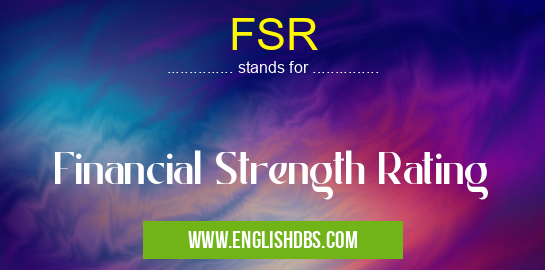What does FSR mean in FINANCE
The Financial Strength Rating, often abbreviated as “FSRâ€, is an assessment of a company's financial strength. A Financial Strength Rating evaluates a company's creditworthiness and helps to answer the question of whether or not it is financially healthy. The rating can be assigned by both external and internal sources, depending on the criteria used and the scope of assessment.

FSR meaning in Finance in Business
FSR mostly used in an acronym Finance in Category Business that means Financial Strength Rating
Shorthand: FSR,
Full Form: Financial Strength Rating
For more information of "Financial Strength Rating", see the section below.
What is FSR
Financial Strength Ratings are based on various factors such as assets, liabilities, liquidity, profitability, solvency ratios and other elements that affect the overall financial health of a business. Financial Strength Ratings are typically expressed in numeric values or rankings that can range from “Very Poor†to “Excellentâ€. A higher score indicates a stronger financial position whereas a lower score implies difficulty in maintaining adequate capital resources.
Why is FSR important?
Financial Strength Ratings provide crucial information for investors and lenders when making decisions about companies they may invest in or loan money to. It allows them to gauge the risk associated with any potential investment or loan and helps them decide whether or not it will be a smart financial decision. Additionally, Financial Strength Ratings also help businesses assess their own financial health by providing an objective view of their performance relative to other similar companies in the same industry.
Essential Questions and Answers on Financial Strength Rating in "BUSINESS»FINANCE"
What is a Financial Strength Rating (FSR)?
A Financial Strength Rating (FSR) is an assessment of the overall financial strength and creditworthiness of an insurer. The rating helps to measure the financial stability of a company and its ability to meet its obligations and manage their risk. It also provides insight into a company's overall financial strength and can serve as an indication of future performance.
What are the components of Financial Strength Rating?
The components that are taken into account when assessing an insurer's Financial Strength Rating include capital adequacy, investment strategies, liquidity, profitability, solvency margins, reinsurance arrangements, management quality and experience.
How often are Financial Strength Ratings updated?
Generally speaking, Financial Strength Ratings change on a quarterly basis. However, some ratings agencies will issue updates more or less often depending on market conditions or other various factors.
Who determines Financial Strength Ratings?
FSRs are determined by independent ratings agencies such as S&P Global Ratings, Moody's Investors Services, A.M. Best Company Inc., Fitch Ratings and Weiss Ratings Incorporated.
How important is a good Financial Strength Rating for insurers?
A good FSR is important for insurers because it serves as a sign to potential investors that an insurer has sufficient capital and liquidity to meet contractual obligations. Additionally, companies with higher rating tend to attract better terms from reinsurers due to their perceived stability in the market.
Are all insurance companies required to publish their Financial Strength Ratings?
No — while many insurance companies voluntarily disclose their FSRs to the public as a way to provide reassurance in their financial soundness and stability, it is not mandatory for them to do so for regulatory purposes.
Are there different types of Financial Strength Ratings?
Yes — the most commonly used type of rating is based on the “Letter-Scale Methodology†which assigns individual ratings ranging from ‘AAA' (high credit quality) down through ‘D' (in default). Other methods include numerical models that assign numeric values from 1-10 (1 being highest risk/poorest outlook).
Is it possible for an insurer's Financial Strength Rating to be increased or decreased over time?
Yes — insurers can both increase or decrease their FSR over time depending on various changes in their financial environment such as changes in capital position or management structure.
Are there any risks associated with investing in lower rated insurers?
Yes — lower rated insurers may have difficulty fulfilling promises made regarding claims payments due to constrained liquidity positions or higher levels of risk taken on investments.
Final Words:
Financial Strength Ratings are instrumental in assessing the creditworthiness of companies, enabling investors and lenders to make informed decisions while also helping businesses evaluate their own financial health relative to their industry peers. All this information combined makes it easier for individuals and organizations alike to identify opportunities that best fit their needs and goals.
FSR also stands for: |
|
| All stands for FSR |
